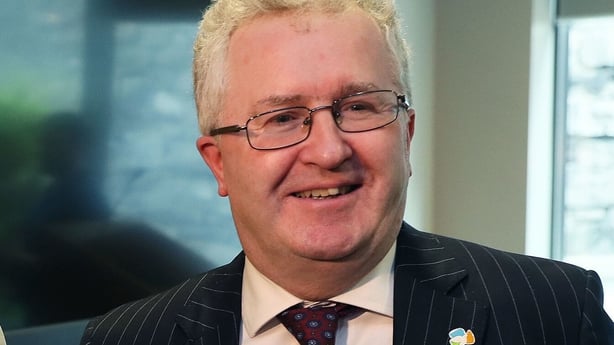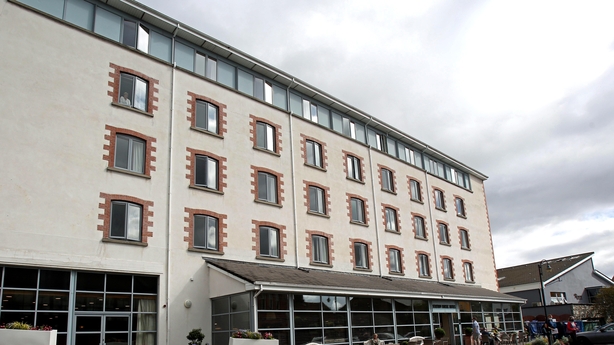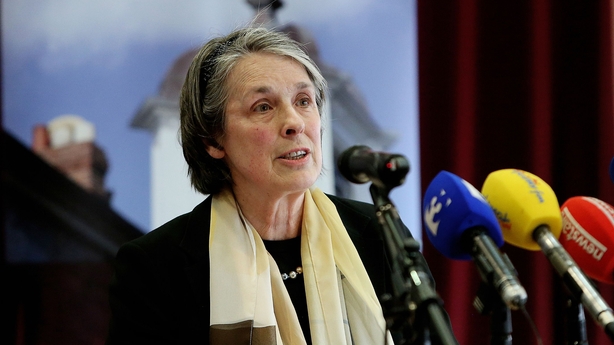Chief Justice tells Seamus Woulfe he ‘should resign’
Updated / Monday, 9 Nov 2020 22:22
Legal Affairs Correspondent
Chief Justice Frank Clarke has told Supreme Court Judge Seamus Woulfe it was his personal opinion that he should resign over the controversy relating to his attendance at a golf dinner in Clifden in August.
However, correspondence between the two men released by the court, in an extraordinary development this evening, makes it clear that Mr Justice Woulfe does not intend to quit.
The Chief Justice also told Judge Woulfe he would not be listed to sit on the court until February next year and “strongly suggested” to him that he should make arrangements to waive or repay his salary for that period.
The judge had offered to donate a month’s salary to charity and make a further apology.
Mr Justice Clarke told Mr Justice Woulfe that it was the unanimous view of all the members of the court that very significant and irreparable damage had been caused to the court.
He said it was not part of his role as Chief Justice to tell him to resign, but he was making clear his personal opinion that to avoid continuing serious damage to the judiciary, that Mr Justice Woulfe should resign.
In his letter to Mr Justice Woulfe last Thursday, the Chief Justice told him that even if the dinner in Clifden was lawful, it did not comply with the objective of the public health regulations, which was to prevent large numbers of people mingling together at social events.
He said it was inappropriate for a judge to attend such an event, as it added to a public health hazard and to a perception that legal technicalities outweigh public health.
Mr Justice Clarke said the guidelines announced by the Government the night before the event reducing the number allowed to gather indoors to six had not come into legal effect, but they reflected the urgent advice of public health experts.
He said judges should exercise vigilance to ensure they comply with such guidelines unless they have strong justification for doing otherwise.
Read more:
5 November letter to Mr Justice Woulfe
9 November letter from Mr Justice Woulfe to Chief Justice
9 November letter to Mr Justice Woulfe from the Chief Justice
The Chief Justice said this was in the interests of public health, and maintaining the social solidarity necessary to contain the spread of the disease, at a time when many people are suffering personal hardship because of the restrictions imposed on their lives.
Mr Justice Clarke said he was required to reprimand his colleague, but said he had no powers to impose any formal sanction on him.
But he said he would not be listed to sit as a judge until February 2021 and he strongly suggested in those circumstances that he should make arrangements to waive or repay his salary.
He said Mr Justice Woulfe had offered to donate a month’s salary to charity and make a further apology, but the Chief Justice did not consider that action sufficient.
A Government spokesperson said the Attorney General has been asked to advise the Taoiseach and the Government on the matter.
They said it would be inappropriate to make any further comment at this stage.
Labour Party leader Alan Kelly has said the legislature arm of State will have to act if this impasse continues.
Sinn Féin justice spokesperson Martin Kenny has said it is “not a desirable, or frankly tenable, situation for a Supreme Court judge to remain in office if he does not enjoy the confidence of the Chief Justice or his colleagues”.
Woulfe’s handling of situation damaged court – Clarke
Mr Justice Clarke said the manner in which Judge Woulfe had dealt with the problem had added very substantially to the damage caused to the court, the judiciary and the administration of justice.
He said he had told him on 21 August that the public view was being formed by reasonable people, not by a media frenzy.
And he said the concentration on narrow and technical issues rather than recognising the serious public concern and the damage to the court had added to the seriousness of the situation.
Mr Justice Clarke said the transcript of Judge Woulfe’s conversation with former Chief Justice Susan Denham showed he did not appreciate the genuine public concern about the event but continued to put the controversy down to a media frenzy.
His statement that he did not understand what he was apologising for when he first apologised, would now significantly devalue any further apology.
The Chief Justice also criticised Mr Justice Woulfe’s comments in the transcript on the Government’s management of the public health crisis and his remarks critical of the Taoiseach and others.
He said judges should not engage in or give rise to matters of controversy involving other institutions of the State.
The Chief Justice said it was his view that the reasonable response of a great number of people to the transcript had caused even greater damage to the judiciary than Mr Justice Woulfe’s attendance at the dinner.
He said it was the unanimous view of all the members of the court that the cumulative effect of all these matters was to cause very significant and irreparable damage to the court and the relationship within the court, which was essential to the proper functioning of a collegiate court.
Mr Justice Clarke said it was not part of his role to tell Mr Justice Woulfe, but he was making clear his personal opinion that he should resign to avoid continuing serious damage to the judiciary.
He noted Mr Justice Woulfe had indicated that he did not intend to resign.
In a nine-page response to the Chief Justice, Mr Justice Woulfe again apologised for his attendance at the dinner and said he fully accepted the opinions, reasons and recommendations set out in Ms Justice Denham’s report.
But he said he had come to the conclusion that he should not resign.

Judge Woulfe said his ill-judged acceptance of the invitation as a newly appointed Supreme Court judge caused offence and hurt to the public and damage to the court and was a cause of profound regret to him.
He repeated that he had checked the event was compliant with all relevant Covid-19 regulation and guidelines, but acknowledged that his attendance raised an incorrect perception that he as a judge had deliberately flouted the regulations.
The former attorney general said that perception had adversely affected the judiciary and the Supreme Court and he was truly sorry.
He said he accepted not being assigned to sit to hear any cases until February and would be willing to forego his salary for three months.
Judge Woulfe said he would transmit his salary for that time to a charity nominated by the Chief Justice and he said he believed that was unprecedented for any judge or public servant in the history of the State.
He said he would be willing to sit, unpaid, as a High Court judge during this period.
Mr Justice Woulfe said he would also accept the Chief Justice’s reprimand if that would ensure resolution of the matter. However, he said he believed the reprimand was based on a misunderstanding.
He said he could not leave some of the remarks in the Chief Justice’s letter stand without comment, as he noted that Mr Justice Clarke had said he intended to publish the correspondence.
Mr Justice Woulfe said he did not think it was helpful or appropriate to publish the correspondence which he said was part of the informal process to resolve the matter.
In his letter, Mr Justice Woulfe takes issue with the way the Chief Justice described the golf event and the government objectives at the time.

Mr Justice Woulfe sets out in detail the regulations in force at the time and the efforts by the Government to reopen the economy. He said there were only 45 people in the room he was in and he did not agree that the event did not comply with the spirit of Government policy.
He repeated again that he was not aware of the new regulations that were announced by the Government on 18 August.
Mr Justice Woulfe said the fact that the president of the court to which he belonged, for whom he had the utmost personal and professional respect, and whom he regarded as a friend, expressed the view that he should resign, was a matter of the utmost seriousness.
He said he had considered whether he should resign to avoid further damage to the judiciary, the circumstances under which a judge should resign under pressure from his fellow judges and the implications of a resignation in such circumstances for the independence of individual judges.
Mr Justice Woulfe said he had thought very deeply about this and had taken extensive advice from a number of people, but had come to the conclusion that he should not resign.
He said he did not think it was fair to characterise his establishment of the true facts of the matter, including the number of people in the room, and the partition between the two rooms as concentrating on the narrow and technical issues.
Mr Justice Woulfe said he was sorry if he had given the impression that he did not appreciate the genuine public concern and was attributing the whole matter to a media frenzy.
He said he fully appreciated the concern, but that the outrage was based on the incorrect assumption that he attended a dinner with 80 people, knowing it was in breach of the regulations.
The judge said his apology was genuine and he repeated it, and he could not see how it was a basis on which he should resign.
He said his remarks critical of members of the Government were not public and he said the public controversy arose from the judicial council’s decision to publish the transcript.
Judge under ‘personal, physical and emotional pressure’
Mr Justice Woulfe said he was under the most intense personal, physical and emotional pressure during his meeting with Ms Justice Susan Denham.
He said he regretted expressing himself in the way he did in relation to remarks about former minister Dara Calleary and whether there was confusion in Government about the status of various regulations.
He said he would not have made a comment about his fellow judges prejudging him, if he had known the transcript was going to be made public.
He said he found a meeting with three of his colleagues on 2 October to be unexpected, upsetting and traumatic as he said he did not get any realistic opportunity to explain himself.
Mr Justice Woulfe said his respect for Mr Justice Clarke was unquestioned and undiminished, and he acknowledged he had taken steps in his conscientious discharge of what he believed to be his duty as Chief Justice in relation to a difficult issue.
He said he did not doubt that the Chief Justice shared his aim of working together in a collegiate and friendly fashion, capable of putting these difficult issues behind them.
In a response, the Chief Justice said he had to consider the cumulative effect of the serious controversy and he criticised Mr Justice Woulfe for continuing to maintain that he had done little wrong.
He said Mr Justice Woulfe had been asked and expressly agreed to the publication of the report by Ms Justice Denham and the appendices, which included the transcript of his conversation.
Call for resignation a genuine assessment – Clarke
Mr Justice Clarke noted that the judge had been asked by him to confirm that he was not suggesting any inappropriate conduct by his three colleagues who met him on 2 October, and had still not addressed this issue.
He said a waiver of his salary was more appropriate than a donation to charity.
Mr Justice Clarke said Judge Woulfe’s accounts, arguments and contentions had been ventilated at very great length to Ms Justice Denham and in extensive correspondence with him.

He said the real burden of Judge Woulfe’s complaints seemed to be that his colleagues were “unwilling to share the benign view” he took of the matters.
The Chief Justice said he recognised the events and the protracted process were a source of damage to the judiciary and the Supreme Court.
But he said he thought it would be more damaging if he was seen to accept Judge Woulfe’s view of the matter.
He said Mr Justice Woulfe’s regret and apology and acceptance of the proposed reprimand were undermined by his insistence that he had done nothing to merit reprimand, criticism or apology and his desire to place responsibility elsewhere.
The Chief Justice said he regretted they had arrived at this situation. But he felt he had no alternative to express his opinion in circumstances where while suggesting he would apologise and make amends, he maintained he did little wrong.
He said he did not think this was sufficient to restore public confidence. He said the media commentary, while hurtful, reflected a lack of insight and understanding on Mr Justice Woulfe’s part of the public reaction.
Mr Justice Clarke said he remained of the view that the judge should resign, but noted that he had said he would not. He said his views were not borne out of ill will, but his genuine assessment of the situation.
